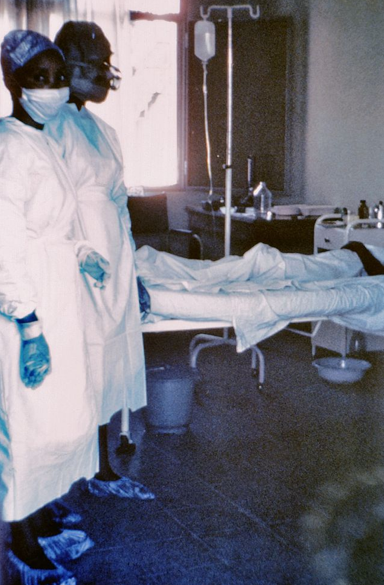President Franklin D. Roosevelt’s maxim — that fear itself is the only thing we need fear — almost certainly rings true for doctors working to beat back the deadliest outbreak of the Ebola virus in history, which is currently raging in four West African countries.

Two nurses with Ebola patient #3, 1976. Photo courtesy CDC via Wikimedia Commons.
Fearful of doctors, young men armed with slingshots and machetes have been preventing doctors and other health workers from entering their villages, the New York Times reports.
“Wherever these people have passed, the communities have been hit by illness,” said one 17-year-old vigilante.
It makes a certain kind of sense: conflate correlation with causation, and the healers are seen as the harbingers of doom. This happens often enough in the USA, among, for example, parents who are convinced that certain of their children’s challenges were caused by vaccination, simply because the two events — the vaccination and the onset of certain symptoms — happened to appear at roughly the same time.
Fear is a potent stimulant, and health workers, many of whom are foreigners, no doubt give restless and frustrated youth a scapegoat at which to aim their distress over a senseless and undiscriminating virus.
“People appear to have more confidence in witch doctors,” the Times reported, noting that traditional ‘treatments’ serve to spread the deadly Ebola virus even further.
Even in countries that are relatively well-served by medical care, convincing people to take advantage of such care can be a challenge. My husband and I certainly encountered this issue in Malawi, even in regard to the virus that causes AIDS.
“Don’t you think that healthy living and herbal remedies are better than the ARVs?” my friend Sostine, a farmer and entrepreneur, asked me.
“Don’t get tested for HIV; don’t rely on condoms or ARVs, don’t listen to the godless foreign health workers,” a pastor told his congregation on World AIDS Day.
It’s not just the “strong belief in traditional religion” cited by the Times that stymies the efforts of health workers. It’s Christianity and Islam as well, and a sticky conviction that, as one woman told a Times reporter, “only God can save us.”
In a context where even an Advil can be impossible to come by, it’s not an unreasonable assumption — to say nothing of the fact that hospitals are often understandably perceived as dangerous places, full of foreigners, where people go to die. Never mind that they were probably going to die anyway: correlation conflates with causation once again.
One of the challenges in such a context — and sometimes, even in our own US context — is to show people how their religious beliefs (i.e., God is “in control”) need not be seen as conflicting with science and with medical treatment: that you can trust in God and get your flu shot or take your antibiotics at the same time. As it stands for many people I encountered in Malawi, it takes a leap of faith to go to the hospital.
That’s why the challenge is often to win hearts and minds while practicing good medicine. If you can’t get people to trust you, you have little hope of helping. If you can’t erase the stigma of, say, an HIV+ diagnosis, you won’t be able to get the infection rates down.
It’s easy to dismiss deeply held traditional and religious believes as “ignorant” and “backward,” but such things are present nearly everywhere in this world of ours — and they are deserving of serious consideration and respect, because lives depend on our understanding such dynamics.
{For an in depth look at a specific, compelling disaster at the intersection of culture, religion, and medicine, I cannot recommend Anne Fadiman’s The Spirit Catches You and You Fall Down highly enough.}





